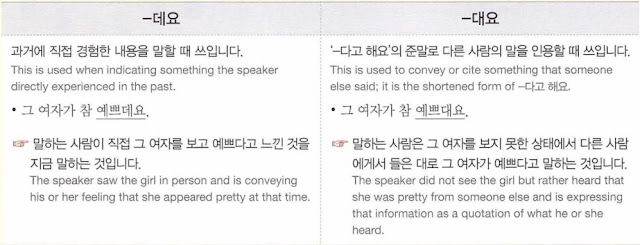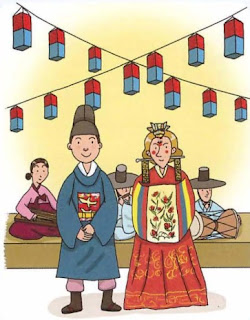가: 지난 토요일에 결혼식 에 간다고 하셨죠?
Didn’t you go to a wedding last Saturday?
나: 네, 친구가 한국 남자와 결혼했는데 민속촌에서 한국 전통 결혼식으로 했어요. 청사초롱이며 전통 음악 연주며 TV 드라마에서만 보던 것을 직접 보니까 색다르고 신기하데요.
Yes, my friend got married to a Korean guy, and they held a traditional Korean wedding at a folk village. It was unique and interesting because I got to see up close a lot of things I had only seen in television dramas, such as traditional lanterns and musical performances.
가: 신랑과 신부가 전통 혼례복을 입 었겠네요.
The bride and groom must have worn traditional wedding clothes as well.
나: 네, 한복을 입은 신부가 연지곤지를 찍고 수줍어하는 모습이 너무 사랑스러워 보이데요. 금발 머리에 파란 눈하고 한복 색깔이 그렇게 잘 어울릴지 몰랐어요. 그걸 보고 있자니 저도 나중에 전통 혼례식으로 하고 싶어지데요.
Yes, and the image of the shy bride wearing a hanbok with rouge on her cheeks and forehead was so lovely. I had no idea her blond hair and blue eyes would go so well with the colors of the hanbok. Looking at their wedding, I also wanted to have a traditional wedding ceremony someday.
데요 is used when the speaker is recollecting something that he or she directly learned or felt in the past and is conveying that information to someone else. It is used mainly in spoken language.

★ 말하고자 하는 사실이나 느낌은 이미 과거에 일어난 것이므로 그 시점에서의 과거. 현재 그리고 추측을 말하는 것입니다.
Because the thing or feeling being conveyed by the speaker has already occurred in the past, the corresponding tense for that particular time—past, present, or supposition—is used.
• 민이가 중국어를 배운 지 얼마 안 됐다고 하던데 꽤 잘하데요.
Mini said she had only been studying Chinese for a little while, but she was really good at it.
• 아침에 수지 씨를 봤는데 오늘 무슨 특별한 일이 있는지 정장을 입고 왔데요.
I saw Suji this morning, and she was wearing a suit like she had something special to do today.
• 옆집 아들은 공부도 잘하고 운동도 잘해서 그 집 부모가 자랑하고 다닐 만하겠데요.
The neighbor’s son is both a good student and athlete, so I understand why his parents are proud.
1. This expression cannot be used when the speaker is the subject of the sentence.
• 나는 초등학교 때 친구가 없데요. (X)
->나는 초등학교 때 친구가 없었어요. (〇)
However, a first-person subject is allowed if the situation being described is something the speaker did not expect or intend to happen.
• 그 츰이 중독성이 있어서 (나는) 나도 모르게 따라 하게 되데요.
• 그 소식을 들으니까 (저는) 갑자기 슬퍼지데요.
2. When the subject is in the second or third person and the predicate is an adjective describing a psychological or emotional state, then the form 형용사+ 아하다/어하다 must be used.
• 너 아까 우진 씨가 회사 그만둔다고 하니까 기쁘데. (X)
->너 아까 우진 씨가 회사 그만둔다고 하니까 기뻐하데. (〇)
• 남자 친구가 청혼을 하자 은미 씨는 무척 행복하데요. (X)
->남자 친구가 청혼을 하자 은미 씨는 무척 행복해하데요. (〇)
3. This expression can be replaced with ‘-더라고요’ and -더군요 with no major change in meaning.
• 민이가 중국어를 배운 지 얼마 안 됐다고 하던데 꽤 잘하더 라고요.
• 민이가 중국어를 배운 지 얼마 안 됐다고 하던데 꽤 잘하더군요.
While both the forms and pronunciation of -데요 and -대요 are similar and can therefore be confusing, note the following differences between them.
 >> You can click on the title of each grammar below to see other grammars which also express ‘Results and Retrospection’
>> You can click on the title of each grammar below to see other grammars which also express ‘Results and Retrospection’
1. -(으)ㄴ 끝에
2. -아/어 내다
3. -(으)ㄴ 나머지
4. -데요
>> Full of ‘Korean grammar in use – Intermediate’: Click here
>> Full of ‘Korean grammar in use – Advanced’: Click here
>> Follow my page to get Korean lessons: Say Hi Korean



![[Korean grammar] 피동 and 사동](https://sayhikorean.com/wp-content/uploads/2021/10/2_83.1.jpg)
![[Korean grammar] 하게체 Expressing Honorifics](https://sayhikorean.com/wp-content/uploads/2021/10/2_81.1.jpg)
![[Korean grammar] 하오체 Expressing Honorifics](https://sayhikorean.com/wp-content/uploads/2021/10/2_80.1.jpg)
![[Korean grammar] -(으)ㄹ래야 -(으)ㄹ 수가 없다 Expressing Emphasis](https://sayhikorean.com/wp-content/uploads/2021/10/2_79.1.jpg)
![[Korean grammar] -기가 이를 데 없다 Expressing Emphasis](https://sayhikorean.com/wp-content/uploads/2021/10/2_78.1.jpg)
![[Korean grammar] 여간 -지 않다 Expressing Emphasis](https://sayhikorean.com/wp-content/uploads/2021/10/2_77.1.jpg)
![[Korean grammar] -(으)ㅁ에 따라 Expressing Situations and Standards](https://sayhikorean.com/wp-content/uploads/2021/10/2_76.1.jpg)
![[Korean grammar] N + 치고 Expressing Situations and Standards](https://sayhikorean.com/wp-content/uploads/2021/10/2_75.1.jpg)
![[Korean grammar] -는 마당에 Expressing Situations and Standards](https://sayhikorean.com/wp-content/uploads/2021/10/2_74.1.jpg)